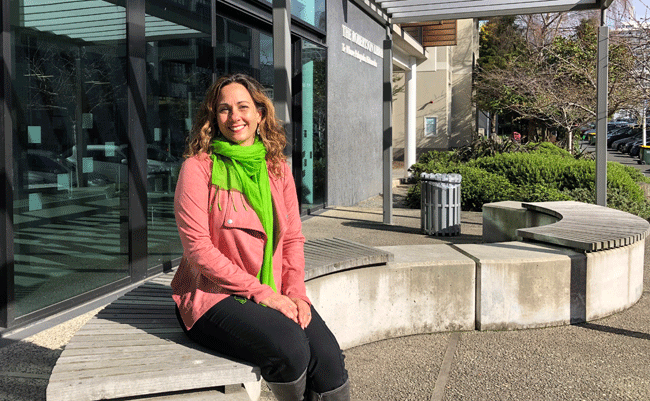Tuesday 1 October 2019 9:51am

The University's new head of filmmaking at the Centre for Science Communication Dr Gianna Savoie.
Sharing the narrative of the ocean is a key driver for Dr Gianna Savoie who has recently started in her new role as the head of filmmaking at Otago’s Centre for Science Communication.
Dr Savoie is a scientist-turned-filmmaker with 20 years’ experience working in the Natural History broadcast industry, with a special affinity for ocean storytelling.
As the Founder of the Ocean Media Institute (OMI), a non-profit global media collective that produces and distributes innovative visual media, her goal is to expand engagement in ocean science and conservation.
“The ocean covers 71 per cent of the world’s surface so it’s physically big, but is also facing huge challenges such as climate change and plastics that have significant implications for the planet and our existence,” Dr Savoie says. “Our work through OMI is making the ocean something that people can really engage and connect with, and be directly part of its stewardship through good decision making.”
"Science itself has function and purpose but without a story, it has no meaning. To get people invested in science, we need to connect them through the narrative."
Dr Savoie believes the understanding and general acceptance of science in society is at a critical stage, and says stories play an important part for increasing further engagement.
“Science itself has function and purpose but without a story, it has no meaning. To get people invested in science, we need to connect them through the narrative.”
Raised in Rhode Island, also known as America’s ‘Ocean State,’ from an early age Dr Savoie connected with the marine environment.
“Dad inspired in me a super appreciation of nature, and he also painted for a hobby so I also learnt to see the world creatively and appreciate its inherent beauty.”
It was this combination of environmental and creative interests that gradually steered Dr Savoie to filmmaking at the completion of her Master’s Degree in Environmental Biology.
“One day I was watching Nature on the natural history programme PBS, and the following day I picked up the phone and asked if they accepted interns, and they said yes for $10 a day!”
She seized the opportunity and moved to New York, was employed six months later and ended up staying for nine years with PBS working on all aspects of film creation including writing and producing.
A return to academia was never on her radar, but that all changed with the offer of a placement to teach as a visiting professional practice fellow at Montana State University, the only other university offering a degree in Science and Natural History Filmmaking similar to Otago’s programme in the Centre for Science Communication.
That opportunity also led to a long association with Montana State University which included completing a doctorate on ocean science communication which was when the idea for OMI was incubated.
OMI was given gravity during Dr Savoie’s involvement in the production of the feature documentary, Te Mana o te Moana The Pacific Voyagers, that followed seven waka as they voyaged by celestial navigation around the South Pacific.
"I’m so excited to be here as the Centre is regarded highly in the world for its work and I’m looking forward to developing further connections across the University and with external organisations such as NGOs."
“The output from the South Pacific project embodied the growth of a trusting relationship and education about my role as a storyteller, which is to listen and learn, so others can listen and learn. The people involved with those voyages are now some of my closest friends.”
Dr Savoie was adamant she would never leave Montana with one exception, which was Otago’s Centre for Science Communication, and eventually the opportunity presented itself.
“I’m so excited to be here as the Centre is regarded highly in the world for its work and I’m looking forward to developing further connections across the University and with external organisations such as NGOs.”
Collaboration is at her core. She says having academic teachers in the Centre also working as professionals in their own fields creates a very applied aspect to teaching and enhances what students can learn from the available streams across filmmaking, writing and science in society.
“Life is interdisciplinary and so too must be our approaches to science communication.”
Dr Savoie is quick to admit she has not only landed the perfect job, but has landed it in the perfect place.
“I have always had this thing for New Zealand with its wild ocean and connection to rugged, raw nature. There is so much here to feed my spirit as well as my work. What more could I want?”
She pauses a moment and with a grin adds, “Oh I know, albatrosses! I also have a thing for them and they’re here too, so I feel really fortunate my path has brought me to Dunedin!”
